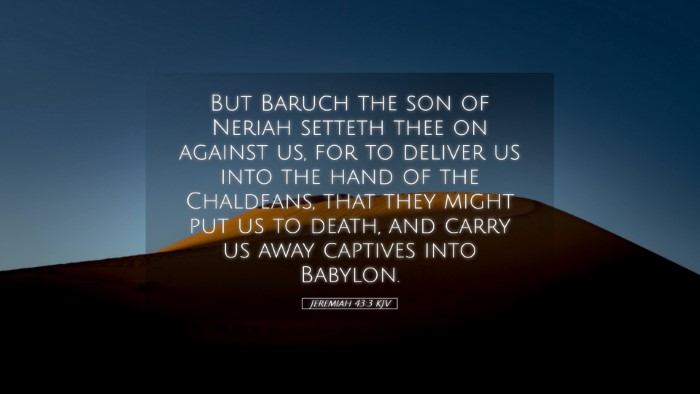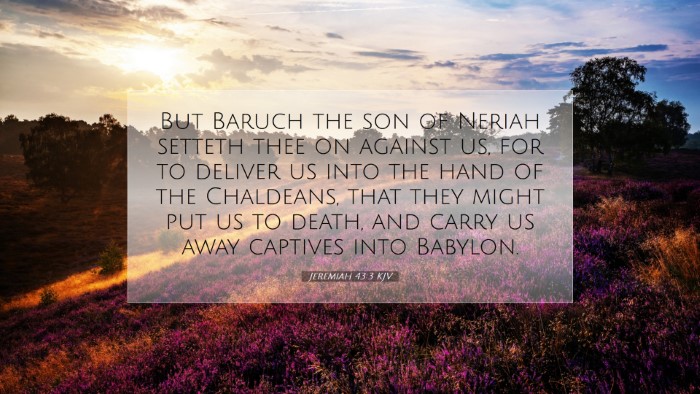Commentary on Jeremiah 43:3
Jeremiah 43:3 states, "But Baruch the son of Neriah setteth thee on against us, for to deliver us into the hand of the Chaldeans, that they might put us to death, and carry us away captives into Babylon." This verse captures the tension and fear within the hearts of the people of Judah after the fall of Jerusalem and reflects their accusations against the prophet Jeremiah and his scribe Baruch.
Contextual Background
This chapter occurs within the larger narrative of Jeremiah's prophetic ministry during the final days of Jerusalem. After the Babylonian conquest, a remnant of the Judahites remain in the land, and they are uncertain about the future. The historical context greatly informs the interpretation of this verse.
Insights from Public Domain Commentaries
Matthew Henry's Commentary
Matthew Henry emphasizes the role of Baruch as Jeremiah's faithful assistant, whose presence and actions are wrongly interpreted by the people. According to Henry, the accusation that Baruch "setteth thee on against us" signifies the people's discontent and distrust toward God's chosen instruments. It highlights the prevalent mindset that external threats can be attributed to the leadership and prophetic declarations, rather than acknowledging their own collective sin and rebellion against God.
Henry further notes that the accusation against Baruch underscores the common human tendency to blame others for the consequences of one's actions. In the face of calamity, the people look for scapegoats rather than recognizing their own responsibility before God.
Albert Barnes' Notes on the Bible
Albert Barnes provides a more historical lens through which to examine this verse, commenting on the nature of the relationship between the Israelite remnant and the Chaldeans. He argues that the fear of capture and death drove these leaders to scapegoat Baruch and Jeremiah as the sources of their impending doom. Barnes presents the response of the people as one of desperation, with their misplaced trust seeking outward deliverance rather than submission to God's will.
Barnes draws attention to the psychological aspects of their accusation: the innate human reaction to chaos, which often results in the abdication of responsibility. The people, rather than yielding to the prophetic counsel that might direct them towards repentance and faith, choose to lash out against those who speak truth to them. This is a timeless warning for congregations today regarding how they might respond to prophetic voices in their midst.
Adam Clarke's Commentary
Adam Clarke provides a detailed exegesis of the motivations behind the accusations faced by Baruch. Clarke points to the fear that encompasses the people; their reaction is not merely based on Baruch's influence but reflects a deeper anxiety regarding their own future. He highlights the irony of the situation: the very messages of warning that Jeremiah and Baruch delivered were intended to steer the people away from destruction.
Clarke notes that the people's deflection of blame onto Baruch echoes throughout history, illustrating how fear can blind people to their divine obligations. He encourages modern readers to reflect on how they handle accountability and the challenges of accepting God's will, especially in times of distress.
Theological Implications
The theological richness of Jeremiah 43:3 extends beyond historical interpretation. This verse raises significant questions about the nature of prophetic ministry, the human response to divine guidance, and the intricate relationship between fear and faith.
Prophetic Ministry: Channel of Accountability
The prophets serve as channels of God's messages, yet their declarations often challenge the status quo. Jeremiah and Baruch’s situation presents an essential truth: that prophetic voices will inevitably face opposition, especially when their words counter the desires of the people. Thus, those in positions of spiritual leadership today must be prepared for resistance when challenging complacency or sinfulness within the congregation.
Fear vs. Faith
The fear exhibited by the people of Judah invites a reflection on the human condition. Their inclination to blame external forces instead of turning inward to confront their disobedience is a common theme in humanity. This conflict between fear and faith remains relevant, challenging both leaders and congregations today to cultivate hearts that trust God’s purpose amidst adversity.
Accountability and Scapegoating
This episode serves as a cautionary tale regarding accountability within the community of faith. The inhabitants of Judah failed to take personal responsibility, instead projecting their fears onto Baruch and Jeremiah. This reflects a broader human tendency to avoid confronting uncomfortable truths. Emphasizing the need for humility and repentance, this passage encourages believers to seek God earnestly, rather than deflecting blame.
Conclusion
Jeremiah 43:3 captures a moment of deep psychological and spiritual turmoil in the aftermath of Jerusalem's fall. By synthesizing the insights of Matthew Henry, Albert Barnes, and Adam Clarke, a richer understanding of the text emerges—one that highlights the consequences of fear, miscommunication, and misplaced responsibility in a time of crisis. The enduring relevance of this scripture challenges today’s readers to reflect on their own responses to prophetic voices, calling them to accountability, deeper faith, and a commitment to accept God’s direction amidst the uncertainties of life.


